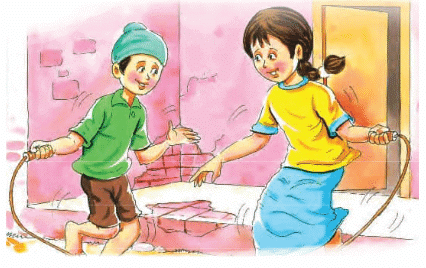Short Answer Questions: Out! Out! | English for Class 2 (Mridang) PDF Download
Q1. What were Jeet and Babli doing on their holiday?
Ans: Jeet and Babli were playing many different games on their holiday. They enjoyed skipping rope and playing hide and seek together.

Q2. Which game did Jeet and Babli decide to play?
Ans: After playing other games, Jeet and Babli decided to play a game called ‘bat and ball’ where one throws the ball and the other hits it with a bat.
Q3. What happened when Babli hit the ball the first time?
Ans: When Babli hit the ball, it went into Mohit’s garden. But Mohit’s house was locked, so they couldn’t go inside to get the ball.

Q4. Why did the game stop?
Ans: The game stopped because they were not able to find the ball. Without the ball, they couldn’t continue playing.
Q5. How did Babli make a new ball?
Ans: Babli used rags, paper, and wool to make a new ball. She rolled these materials together tightly and tied them with a piece of string to keep it in place.

Q6. Did Jeet and Babli like the new ball?
Ans: Yes, they really liked the new ball. It was good enough to play with, so they felt happy and excited.
Q7. What did Babli do after the new ball was made?
Ans: After making the new ball, Babli threw it to Jeet. Jeet got ready with his bat and hit the ball hard.
Q8. What happened to the ball after Jeet hit it hard?
Ans: The ball broke open, and the pieces of rag flew into the air. The ball was no longer whole.

Q9. What did Babli do when the ball scattered?
Ans: Babli quickly jumped and caught one piece of the rag. Then she shouted loudly, “OUT! OUT!” to say that the ball was broken.
Q10. What does shouting “OUT! OUT!” mean in the game?
Ans: When someone shouts “OUT! OUT!” it means a player is out or the turn is lost. It usually means the game has to stop or a new player comes in.
|
19 videos|250 docs|13 tests
|
FAQs on Short Answer Questions: Out! Out! - English for Class 2 (Mridang)
| 1. What is the main theme of the poem "Out! Out!" by Robert Frost? |  |
| 2. How does the setting contribute to the poem's overall message? |  |
| 3. What literary devices are used in "Out! Out!" and how do they affect the poem? |  |
| 4. How does the poem reflect Robert Frost's views on nature and humanity? |  |
| 5. What emotions does the poem evoke in the reader, and why is it significant? |  |
















